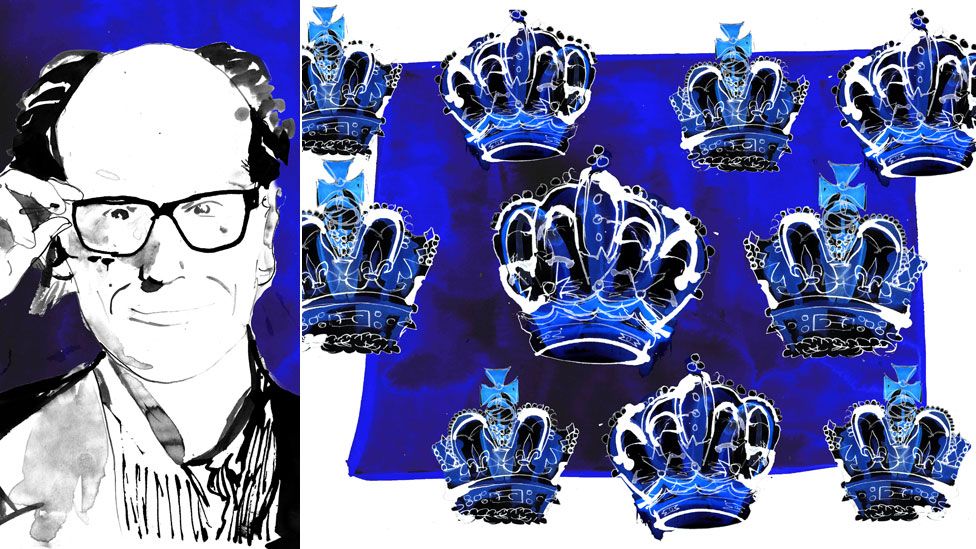Will Gompertz reviews season two of Netflix's The Crown ★★★★☆
- Published

The Crown is back. The second season of the royal drama, which is released on Netflix next weekend, consists of 10 one-hour episodes covering Queen Elizabeth II's life between 1956 and 1963.
It does, on occasion, shift back and forth a bit more than that, but then what would you expect when you have an ex-Time Lord playing Prince Philip?
You're in for a treat if you like your period drama served with lashings of schoolboy history, a few large dollops of poetic licence, and tastefully presented by someone wearing a comfy cashmere cardy.
All you have to do is readjust your mind-set to a time when a ridiculously plummy accent was a sign of status, and not an affectation routinely adopted by estate agents in the Cotswolds.
Even then, there are instances when the cut-glass voices become - as the Queen might say - simplee too much.
One such scene sees Harold Macmillan (Anton Lesser) having a man-to-man chat over a game of snooker with naughty John Profumo. It should feel terribly serious; the government's very reputation is at stake.
But instead of being drawn into the thickening dramatic plot, you find yourself behaving like Macmillan's unfaithful wife and laughing at him.
Not for being rubbish in bed, or whatever gripe she had, but because he sounds exactly like the spoof 1930s newsreader, Mr Cholmondley-Warner, from Harry Enfield's 1990s TV series.
Which is not to say the show is without its own intentional humour. There are plenty of gags usually deployed in the form of a crisp line from Prince Philip to his self-possessed missus.
Both characters are portrayed largely sympathetically, although the real Duke of Edinburgh might have a few choice words of his own to say about the show's focus on his libido rather than his intellect, not to mention how it speculates and implicates him in the notorious Profumo affair.
Claire Foy returns to give us a reprise of her Queen, and once again she nails the role.
There are moments when you think she's going to blow it; you can see her teetering on the edge, pushing it to the point of no return where you fear she's going to allow something appallingly hammy or horribly trite to undermine her character, but every time she pulls back from the brink and delivers a perfectly-timed comment or expression.
She is a fine actress. And Matt Smith is an excellent foil as the philandering Philip. They're a decent double act.
As are Vanessa Kirby's Princess Margaret and Matthew Goode's Antony Armstrong-Jones, who own Episode 4, and make it the stand out show of the series.
Among the hits, there are one or two misses.
Episode nine is weaker than most. It focuses on the education of Prince Charles and his father's decision to send him to the harsh environs of Gordonstoun School in the north of Scotland instead of the perfectly nice local school, Eton.
We're taken back to young Philip's early days, get an eyeful of some Nazi sympathising relatives, and see the boy turn into the man he would become.
Quite how the crack team behind the show managed to turn such rich dramatic potential into a slightly dull hour of telly is as bewildering as the miscasting of Victoria Hamilton as the Queen Mother.
There's nothing wrong with Hamilton as an actress, but the way in which she has been asked to play this role doesn't strike true and adds nothing when, even with a touch of nuance, so much more could have been said.
But these are small gripes.
Overall, The Crown is a first-class piece of television, which is beautifully shot and boasts many fine performances.
Peter Morgan's well-crafted scripts allow our imaginations to conceive the unknowable - how the Queen reacted to events from the Suez Crisis to the assassination of President Kennedy, and what effect her actions may have had on the world today.
There's no doubt she has had a big impact on Morgan's life. This is the third time he has written about the present-day monarch (The Crown was preceded by his Oscar-winning film, The Queen, and Olivier-winning play, The Audience).
In fact, he has done so well out of writing about her life it is probably about time he offered her a royalty payment.